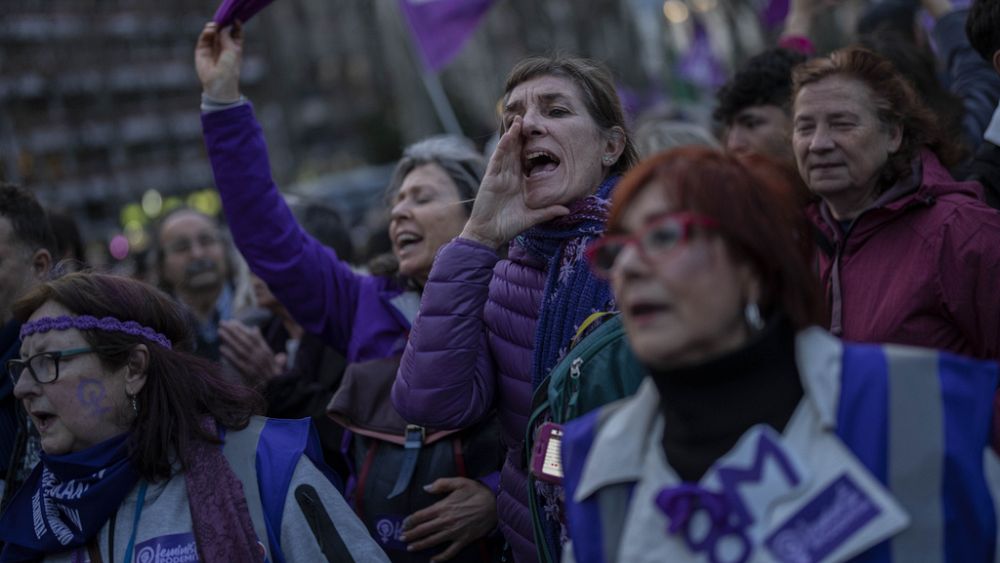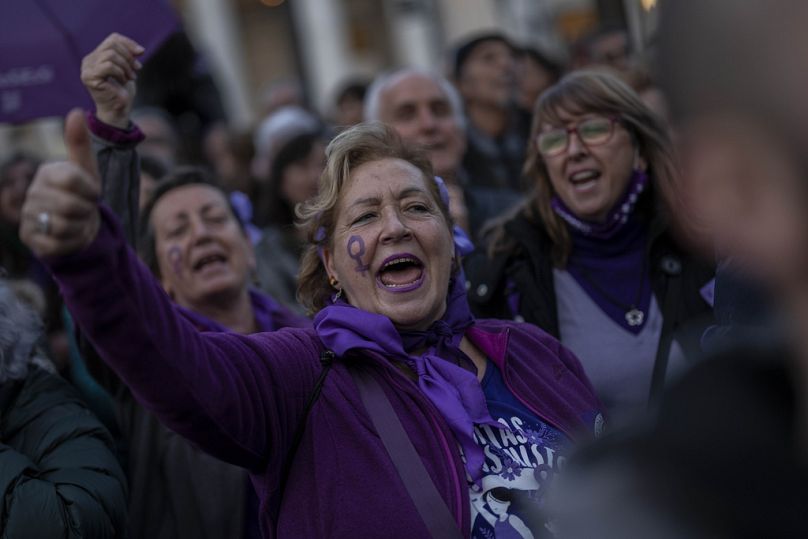Spain’s powerful feminist movement split over trans and rape laws


Just half an hour separated the start of two big feminist rallies which took place in Madrid this week. On one side, the 8M Commission. On the other, the Madrid Feminist Movement.
This was the second consecutive year that the protests for International Women’s Day had split, but this time round the divisions were deeper.
The strength of the Spanish feminist movement has been weakened by internal wrangling.
Myriam Rodríguez, a journalist from Madrid, had been debating with her friends which rally the would go to: last year she chose to boycott both of them.
“I didn’t go to any of them because I had a feeling of sadness and pain due to the lack of understanding shown by certain feminist groups”, she told Euronews, adding that she was not the only one among her group of friends who made this decision.
This year, Rodríguez did attend, and decided to march with the largest crowd, the one brought together by the 8M Commission — which has organised the event since 1977 — supporting new trans rights legislation and against the reform of the rape law.
Their march gathered 17,000 protesters, according to the government delegation, while other years the number rose to 120,000.
“I think it is the one that advocates plurality in feminism without trying to stand out as the only voice”, Rodríguez explains.
The Spanish ministers also joined the main rally, which supported the political stance of Unidas Podemos, the minority party in the government coalition with the Socialist Party.
Members of the opposition, attended the alternative demonstration, along with 10,000 people.

Spain’s Equality Minister Irene Montero, center, Spain’s Secretary of State for equality and against gender violence Angela Rodriguez, right, and other members of Podemos.Bernat Armangue/Copyright 2023 The AP. All rights reserved.
Why is there a divide?
The marches in Spain for International Women’s Day reached its peak as a global reference in 2018, when a successfully organised nationwide strike consolidated its position amongst Europe’s most feminist countries.
But ever since, divisions have emerged in the movement over two new pieces of legislation: the ‘transgender law’ and the so-called ‘only yes means yes’.
- Is Spain’s new rape law reducing jail sentences of sex offenders?
- Finland passes new, progressive trans rights laws on gender recognition
- As Spain advances trans rights, Sweden backtracks on gender-affirming treatments for teens
The debate over the new ‘transgender law’
Two years ago, a group of women left the commission and decided to organise their own demonstration on Women’s Day”, Arantxa López, spokesperson for the 8M Commission, told Euronews.
Arguing the new ‘transgender law’ would mean an “erasure of women”, the Madrid Feminist Movement decided to split from the general 8M Commission.
While López and her organisation support the law and gender self-determination, which allows a person to change their name and gender on their identity papers by means of a simple administrative declaration, Madrid’s Feminist Movement is strongly against it.
“The transgender law allows any man to identify himself as a woman and use spaces reserved for women. Safe spaces such as changing rooms and bathrooms,” says Sonia Gómez, spokesperson for Confluence Feminist Movement, one of the associations inside the new organisation.
“Self-determination is the only case where a person says they feel one way and the law listens to them; in what other scenario can someone change their legal situation with just a simple declaration? Any rapist can self-determine and go to women’s prison, as has just happened in Scotland”, adds Gomez.
To try to avoid this from happening, the transgender law establishes that the crime will be judged on the basis of the person’s legal sex at the time it was committed.
However, Gómez says that when they tried to discuss their disagreements, there was no room for dialogue, which is why they decided to leave the movement.
For López and the 8M Commission this discourse should not be valid. “This was one of our red lines, we are not going to accept any hate speech against transgender people, nor are we going to question the rights of any person in general,” she says.
“There is no framework in which to debate, because you cannot debate against hate speech. Everything that has been generated around the transgender law is based on hoaxes, it is a trivialisation of the process. I know first-hand how difficult it is,” López adds.
However, this is year the division has run deeper due to another law which was aimed at protecting women by increasing years in jail for rape convictions, but has caused the contrary.

Protesters attend an International Women’s Day demonstration in Madrid, Wednesday, March 8Bernat Armangue/Copyright 2023 The AP. All rights reserved.
What is the controversy with the new rape law?
Since last autumn the feminist movement has become even more polarised, after the Spanish Congress passed the “only yes means yes” reform. It was the Ministry of Equality’s flagship piece of legislation.
This new law was made to give more importance to the role of consent. In order to do this, it merged the meaning of ‘assault’ and ‘abuse’ into the same offence. They ended up establishing the maximum limit for assaults with the minimum for abuse.
What was meant to be stricter than the previous code in place, instead has resulted in reduced jail sentences for 721 sex offenders and 74 have been released from prison since its signing last October 2022, according to data published by the General Council of the Judiciary.
This is why, this year, the march led by the Madrid Feminist Movement carried banners asking for the resignation of Irene Montero, Spain’s Minister of Equality.
For Gómez, who represents the Madrid Feminist Movement, the laws “are not well made” and are fragmenting the movement in Spain. “This law in particular has some good points, but in general it is not well done and jurists have already warned that it would get sexual offenders out of jail”.
Many voices have called for a change in the law, however the 8M Commission, organiser of the historical march, doesn’t believe in its reform.
Podemos and the Ministry of Equality also defend its original text and have voted against a reform promoted by its partner in government, the Socialist Party. This week the law was passed in Congress.
“We believe that the Ministry of Equality has not passed any law that helps women and the minister, Irene Montero, does not want to hear organisations that do not agree 100% with her proposals”, says Gómez.
“They believe they are the owners of feminism and they don’t listen to anyone else,” she adds.
The division is more complex than being in support or against the transgender law or Montero’s policies. These are only the tipping factors that have caused the divided image of feminism and, even though the split movement is still a minority, their voice is growing stronger.
Just half an hour separated the start of two big feminist rallies which took place in Madrid this week. On one side, the 8M Commission. On the other, the Madrid Feminist Movement. This was the second consecutive year that the protests for International Women’s Day had split, but this time round the divisions were deeper. …
